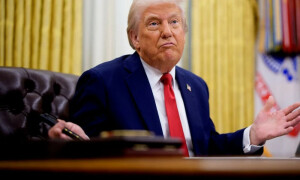Germany's general election brought the pro-business Free Democratic Party a triumphant return to parliament, but memories of its near-death experience last time will make for tough coalition talks with consequences beyond Germany's borders.
As the Social Democrats head for the opposition benches, an unlikely match-up between the FDP, Chancellor Angela Merkel's conservative CDU/CSU alliance and the Greens looks like the only option for government.
The prospect of a "Jamaica" alliance, named after the parties' colours of black (CDU), yellow (FDP) and green has thrown the gulfs between the parties' political convictions into stark relief.
Bringing the three together on climate, economic and fiscal policy would be difficult enough, but the FDP's biggest spanner in the works could come on Europe.
Its youthful party leader Christian Lindner has rejected any reform of the euro single currency area - pushed by French President Emmanuel Macron and cautiously welcomed by Merkel - that would create a centralised budget to smooth out national economic crises, managed by a eurozone finance minister.
And the FDP would prefer to use Germany's bumper budget surpluses to offer voters and businesses 30 billion euros ($35.7 billion) in tax cuts, rather than investing the cash at home and shrinking the country's trade surplus as its foreign partners have demanded.
"Of course we're ready to take on responsibility," Lindner told journalists in Berlin Monday, while warning "there would be nothing worse than continuing the policies of the past four years with new colours".
"We think it's necessary for the law to encourage individual responsibility" in European countries' finances, Lindner declared.
The FDP would be prepared to back some increased investments using existing mechanisms like the European Investment Bank, he said.
But "we couldn't agree to a eurozone budget which would automatically lead to fiscal transfers in the EU, that wouldn't solve problems but make them worse," Lindner added, hammering home his promise the previous night not to divert German cash to "French public spending or fixing Berlusconi's mistakes" in Italy.
What's more, the FDP has long complained that Greece was not pushed out of the eurozone to deal with its debt mountain without menacing the single currency.
Lindner repeated Monday his call for a bankruptcy procedure for EU nations that would allow them to quit the euro without being forced to leave the bloc altogether.
FDP leaders used Monday's post-election press conference to highlight their differences with both Merkel's CDU and the Greens.
Merkel had taken the country too far towards social democracy, Lindner charged, while attacking the ecologists on their home turf of climate policy - accusing them of being obsessed with banning fossil fuels.
"The Greens will have to tread a very long road to reach discussions about Jamaica," Lindner insisted.
The Free Democrats' caution about entering government dates back to 2013, when the party failed to clear the 5.0-percent hurdle to make it into parliament after four years of coalition with Merkel when they struggled to make an impact.
The party is back with 10.7 percent of the vote, enough for 80 seats - but "Lindner knows how quickly he could lose his 10 percent" if he makes too many concessions, news weekly Der Spiegel commented.
As the CDU's preferred coalition partner for decades, the differences between the FDP and the conservatives will be more easily overcome than those with the left-leaning Greens.
Climate will top of the list of Green-FDP clashes, but other points of friction promise to set sparks flying.
For example, Lindner's bid to limit losing voters to the far-right, anti-immigration AfD, which entered the Bundestag for the first time Sunday with a historic 12.6-percent score, saw him call for all refugees in Germany to return home once it is safe to do so.
By contrast, the Greens want to create more safe and legal ways for refugees to reach Europe and to allow Syrians in Germany to bring their families to join them.
Nevertheless, there are common points, like the parties' insistence on reform to the uneven state-by-state patchwork of the education system, focus on speeding up Germany's creeping progress in building high-speed internet connections and the high value both place on civil rights.
Asked about how coalition talks might go, FDP deputy leader Wolfgang Kubicki told reporters "my imagination is unbounded, but it has its limits."
BR100
12,239
Decreased By
-154.2 (-1.24%)
BR30
36,393
Decreased By
-714.3 (-1.92%)
KSE100
114,153
Decreased By
-1379.3 (-1.19%)
KSE30
35,200
Decreased By
-461.3 (-1.29%)





















Comments
Comments are closed.